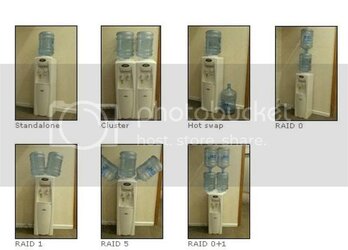- Joined
- Apr 10, 2002
- Location
- Racine
OK folks I recently lost dta located on a 500GB WD HDD. I had it spanned across several disks, therefore I recovered the lost data. I have now ordered three new 500GB disks with the idea of setting on RAID 5 on my P5B DLX. In discussing this with a fellow IT guru he mentioned I was making a bad move and should go with RAID 1 rather. His thoughts were the RAID 5 had to deal with the parity and offered the same fault tolerance as the mirror would. He felt I should stay with RAID 1 and keep the third for a replacement if ever need be. I guess I felt the RAID 5 was better based on three discs giving me a a more advantageous probability.....right? I figured there is a one in three chance of a disc going bad vs 1 of 2. Anyhow I realize I may get a performance hit with 5 vs
1 as well and understanding that 5 is also "hot swappable." Please give me your thoughts, either way I have three new discs just wondering now which array to go with. CYA!
1 as well and understanding that 5 is also "hot swappable." Please give me your thoughts, either way I have three new discs just wondering now which array to go with. CYA!
